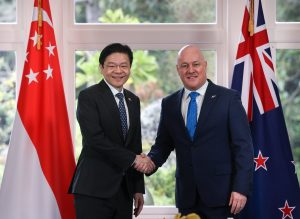Singapore and New Zealand have signed a Comprehensive Strategic Partnership, pledging to collaborate more closely in a host of areas, including defense, trade, and supply chain resilience.
The agreement was signed today in Auckland by New Zealand’s Prime Minister Christopher Luxon and visiting Singaporean Prime Minister Lawrence Wong, who said that the two nations were determined to “turn challenges into opportunities” at a time of growing international turbulence.
“Singapore and New Zealand may be small in size. But we have shown time and again that the power of our partnership far outweighs our scale,” Wong told a joint press conference at Government House in Auckland.
In a Joint Vision Statement announcing the CSP, which coincides with the 60th anniversary of relations between Singapore and New Zealand, the two countries said that they are “committed to a secure and prosperous region, underpinned by international norms and rules that ensure the free movement of goods and people.”
Speaking alongside Wong, Luxon described Singapore as “one of our closest partners.” He added, “As small states, it’s important we work side-by-side to keep trade open, strengthen security, and defend the rules-based order.” Through the new CSP, he added, “we have committed to tackling the next generation of challenges together, from supply chain resilience and digital trade to climate change and maritime security.”
According to the Joint Vision Statement, the CSP will be guided over the coming decade by a Plan of Action for closer cooperation in six key areas: defense and security; science and innovation; people-to-people relations; climate and the green economy; and supply chains and connectivity. Among its host of specific initiatives are the establishment of an annual leaders’ meeting, deeper collaboration in investment and capital markets, and a strategic partnership to bolster food security, Wong said, as per the Straits Times.
New Zealand is the fourth country with which Singapore has a CSP, alongside Australia, Vietnam, and India.
Wong arrived in New Zealand from Australia, where earlier this week he signed an upgrade to the CSP established by the two nations in 2015. This includes a pledge to further develop defense ties, in particular, enhanced reciprocal access to each other’s military facilities. The consolidation of relations with Australia and New Zealand marks an effort by Singapore to adjust to an era of intensifying geopolitical tensions, economic protectionism, and technological disruption. Last month, Singapore’s Foreign Minister Vivian Balakrishnan said that Singapore would seek to meet the challenges of this world by consolidating its existing relationships and expanding its “circles of friends.” The rationale is similar for New Zealand, another small nation whose prosperity depends on open trade and regional security.
The CSP builds on a bilateral relationship that has been among the most fruitful for both nations. In 2000, the two nations established a free trade agreement, Singapore’s first with any nation, to which an upgraded protocol was added in 2020. In 2019, they agreed to an Enhanced Partnership that covered trade and economics, defense, and supply chain security.
In addition to the CSP, Singaporean and New Zealand officials also concluded a “first of its kind” agreement on trade in essential supplies. Under the agreement, which formalizes an arrangement that began during the COVID-19 pandemic, the two nations have pledged to trade essential goods such as medicines in times of crisis and not to impose export restrictions. The agreement “will give assurance to both our countries and to both our peoples that in times of need, we will always be there for one another,” Wong said. He will depart New Zealand tomorrow.




























